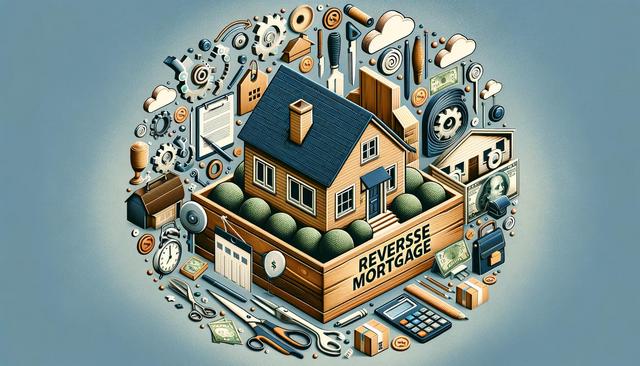The Basics of Reverse Mortgages
Reverse mortgages are financial products aimed primarily at older homeowners, allowing them to convert a portion of their home equity into cash. While this may appear to be a practical solution for seniors needing supplemental income, it’s crucial to understand how the process works. Unlike a traditional loan, a reverse mortgage does not require monthly repayments. Instead, the loan is repaid when the borrower sells the home, moves out permanently, or passes away. But before considering this option, one should ask: How Much Money Can You Get With a Reverse Mortgage? The amount depends on several factors such as the home’s value, the borrower’s age, and current interest rates.
Despite the initial appeal, reverse mortgages come with fees, interest, and the possibility of decreasing home equity over time. Homeowners should be aware that while the loan provides cash, it also accrues interest that compounds monthly. This can significantly reduce the remaining equity in the home, which raises questions like Do You Keep Ownership of Your Home With a Reverse Mortgage? In most cases, yes, homeowners retain the title, but they must continue to pay property taxes, insurance, and maintain the home to avoid loan default.
Risks to Home Equity and Ownership
One of the most pressing concerns about reverse mortgages is the potential erosion of home equity. As the loan balance increases over time, the equity available for heirs or future financial needs can shrink dramatically. This leads to essential considerations such as Can Your Children Inherit the Home With a Reverse Mortgage? Technically, yes—they can inherit the home, but only if they can repay the outstanding loan amount, which often requires selling the property.
Some of the risks associated with reverse mortgages include:
- Loss of equity due to growing loan balance
- Difficulty for heirs to retain ownership
- Foreclosure risks if tax and insurance obligations are not met
- High upfront costs and servicing fees
These factors contribute to the perception that reverse mortgages may not be the best solution for every homeowner. Understanding the full implications can help determine whether this financial tool aligns with long-term goals. In recent years, consumer advocacy groups have raised concerns and encouraged stricter regulations to ensure fairness and transparency in the reverse mortgage process.
Evaluating Reverse Mortgage Companies
Choosing a reputable lender is critical when entering into a reverse mortgage agreement. Given the long-term implications, it’s essential to work with professionals who provide comprehensive guidance and clear terms. Many retirees seek out the Best Reverse Mortgage Companies for Seniors to ensure they are working with institutions known for integrity and customer service. While no company can be labeled as the absolute best, some are considered among the top options due to their transparent practices and solid reputations.
When evaluating reverse mortgage providers, consider the following:
- Licensing and accreditation
- Customer reviews and complaint records
- Availability of financial counseling
- Clarity of terms and fee structures
Borrowers should also verify whether the lender requires third-party counseling, which is often mandated to ensure the homeowner fully understands the loan terms. This added layer of protection helps to minimize the risk of entering into a contract that may not be in the borrower’s best interest. In 2025, increased scrutiny and regulation may further improve the safety of these transactions, prompting many to ask: How Safe Is the Reverse Mortgage Process in 2025?
Regulatory Measures and Consumer Protections
In response to the growing concerns around reverse mortgages, regulatory bodies have implemented stricter rules to protect consumers. These measures include mandatory counseling sessions, improved disclosure requirements, and limits on aggressive marketing practices. These changes aim to ensure that seniors are making informed decisions rather than being rushed into complex financial agreements.
Some of the key protections include:
- Mandatory counseling by HUD-approved agencies
- Loan suitability assessments
- Cooling-off periods before finalizing the loan
- Enhanced disclosures about costs and risks
These safeguards help answer the question, How Safe Is the Reverse Mortgage Process in 2025? While the process has become safer, it still requires diligence from homeowners. Potential borrowers must take the time to read all documentation carefully and consult with independent financial advisors who are not affiliated with the lender. This can help ensure that the loan truly fits their financial situation and goals.
Making an Informed Decision
Reverse mortgages are not inherently bad, but they are not suitable for everyone. The key lies in understanding the long-term implications and weighing them against other financial options. Questions like Do You Keep Ownership of Your Home With a Reverse Mortgage and Can Your Children Inherit the Home With a Reverse Mortgage highlight the importance of looking beyond the immediate financial relief and considering the broader impact on estate planning and family inheritance.
Before proceeding with a reverse mortgage, homeowners should:
- Evaluate their long-term housing plans
- Consider alternative income sources
- Discuss the decision with family members
- Seek unbiased financial advice
For some, a reverse mortgage can offer a practical solution to cash flow challenges in retirement. For others, the risks may outweigh the benefits. By asking the right questions—including How Much Money Can You Get With a Reverse Mortgage and researching the Best Reverse Mortgage Companies for Seniors—homeowners can navigate this complex financial product with greater confidence.
Conclusion: A Cautious Path Forward
For seniors considering a reverse mortgage, knowledge is the most important asset. While these loans can offer financial relief, they also come with significant responsibilities and potential risks. Understanding the answers to key questions like How Safe Is the Reverse Mortgage Process in 2025 and Can Your Children Inherit the Home With a Reverse Mortgage is essential for making an informed decision. Homeowners should carefully assess their financial needs, consult with qualified professionals, and involve family members in the discussion. This measured approach helps protect home equity and ensures that this financial choice aligns with long-term goals and values.



Leave a Reply